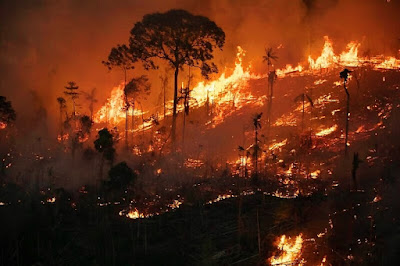Forests around world being changed from carbon sinks into carbon sources, making it harder to slow global heating
Wildfires are burning through the carbon budget that humans have allocated themselves to limit global heating, a study shows.
The authors said this accelerating trend was approaching – and may have already breached – a “critical temperature threshold” after which fires cause significant shifts in tree cover and carbon storage.
“Alarmingly, the latest temperature at which, globally, these impacts become pronounced is 1.34C – close to current levels of warming [above preindustrial levels],” said the UK Met Office, which led the research.
Forests are going up in smoke in Brazil, the US, Greece, Portugal and even the Arctic Circle amid the Earth’s two hottest years in recorded history.
Each fire has a double impact on the global climate: first, by emitting carbon from the burned trees, and second, by reducing the capacity of forests to absorb carbon dioxide.
This adds to the heat in the Earth system, which has already been raised by the burning of gas, oil and coal. Global temperatures are already 1.3C higher than in the preindustrial age, according to the Met Office.
Pantanal - BrazilPantanal - Brazil
Amazon - Brazil
Amazon - Brazil
As temperatures rise, droughts become more frequent, rainy seasons shorten and forests become more vulnerable to fire. This is made worse by human clearance of land for farms, which is particularly pronounced in South America. A separate study last week showed the continent is becoming warmer, drier, and more flammable.
Other research showed the Amazon is undergoing a “critical slowing down”, with more than a third of the rainforest struggling to recover from drought after four supposedly “one-in-a-century” dry spells in less than 20 years.
These compounding impacts, which scientists call positive feedbacks, are turning forests from carbon sinks into carbon sources.
This makes it harder to slow global heating, even before the world reaches the 1.5C lower target of the Paris climate agreement.
“Fires are reducing the ability of forests and other ecosystems to store carbon, narrowing our window to keep global warming in check,” said Dr Chantelle Burton, the study’s lead author.
This is not the only positive feedback that concerns scientists, who are also worried that the rapid melting of ice caps is reducing the planet’s “albedo” ability to reflect sunlight back into space.
Climatologists say the already dire situation will deteriorate until humankind, particularly in the wealthy global north, stops burning fossil fuels.










No comments:
Post a Comment